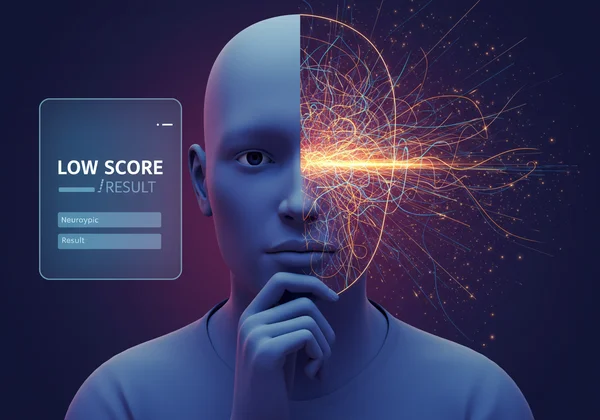Low Aspie Quiz Score & Still Feel Different? Explore Why.
October 11, 2025 | By Leo Sinclair
Feeling a sense of disconnect after taking an online test can be confusing. You received a low aspie quiz score, yet the feeling of being different, of processing the world in a unique way, remains. What do my Aspie quiz scores mean if they don't seem to match my experience? If this sounds familiar, you are not alone. This journey of self-discovery is rarely a straight line, and a single quiz result is just one signpost along the way, not the final destination.
This article is here to validate your feelings and explore the many valid reasons why your internal experience might not align with your quiz results. Let's delve into what your score means, what it doesn't, and what empowering steps you can take next. Your journey of understanding is important, and you can start your journey with clarity and self-compassion.
Understanding Your Aspie Quiz Score and Its Limits
Receiving a result that feels unexpected can be disheartening, but it's crucial to place it in the proper context. The Aspie Quiz is a powerful tool for initial self-exploration, designed to highlight traits associated with the autism spectrum. However, it is not—and was never intended to be—a definitive diagnostic instrument.
What the Aspie Quiz Measures (and What It Doesn't)
The Aspie Quiz excels at screening for specific patterns of behavior, communication styles, sensory experiences, and interests that are commonly associated with Asperger's and the broader autism spectrum. It provides a valuable snapshot based on your self-reported answers.
However, its scope has limitations. It cannot account for the complex, nuanced tapestry of your entire life experience. It doesn't measure your coping mechanisms, your learned social strategies, or other underlying factors that might influence how you present to the world and even to yourself. Understanding the quiz accuracy means recognizing it as a starting point for reflection, not a final judgment.
Why a Neurotypical Score Isn't the End of Your Self-Discovery
Seeing a "neurotypical" score when you feel anything but can be jarring. Instead of viewing this as a dead end, consider it a new direction. This result doesn't invalidate your feelings or experiences. It simply suggests that, based on the specific questions asked, your traits may not fit neatly into the pattern the quiz is designed to detect. Your self-discovery journey is far from over; it's just taken an interesting turn. This is an invitation to look deeper and explore other possibilities that make you uniquely you.

Beyond Aspie: Other Reasons You Might Feel "Different"
If autism doesn't seem to be the complete answer, what else could be contributing to your feelings of being different? The human mind is incredibly complex, and many experiences and conditions share overlapping traits. Exploring these can bring profound clarity.
The Impact of Autistic Masking: Hiding Your True Self
Masking, or camouflaging, is the subconscious or conscious act of suppressing natural behaviors and mimicking neurotypical ones to fit in. Many individuals, especially women and those socialized as female, become so adept at masking from a young age that they may not even recognize their own underlying traits. You might have learned to force eye contact, rehearse conversations, or suppress stimming behaviors. This can lead to a low score on a self-assessment because you're answering based on your learned behaviors, not your innate instincts.

Could It Be ADHD? Exploring ADHD vs Autism
Attention-Deficit/Hyperactivity Disorder (ADHD) and Autism Spectrum Disorder (ASD) are distinct neurotypes, but they share a significant number of traits. Both can involve challenges with executive function (like planning and organization), intense interests (hyperfixations), and social difficulties. However, the root cause often differs. For example, a person with ADHD might miss social cues due to inattention, while an autistic person might miss them due to challenges in interpreting non-verbal communication. It's entirely possible your experiences align more closely with ADHD.
Highly Sensitive Person (HSP) and Sensory Processing
Do you feel overwhelmed by bright lights, loud noises, or strong smells? Are you deeply moved by art and music and keenly aware of others' emotions? You might be a Highly Sensitive Person (HSP). This is not a disorder but a personality trait involving a sensitive nervous system. While many autistic people have significant sensory processing sensitivities, being an HSP is a distinct experience that can also make you feel profoundly different from those around you.
Trauma and Its Effects on Social Interaction
Past trauma, particularly developmental or complex trauma (C-PTSD), can profoundly shape how you interact with the world. Experiences like social anxiety, difficulty trusting others, feeling disconnected or "on guard," and struggling to understand social dynamics can be trauma responses. These can sometimes resemble autistic traits, creating confusion. Healing from trauma is a unique journey that can help clarify which feelings are linked to past experiences.
Co-occurring Mental Health Conditions
Anxiety and depression are extremely common and can also influence how you perceive yourself and interact with others. Social anxiety, for example, can make social situations feel draining and confusing, an experience also common among autistic individuals. These conditions can exist on their own or alongside neurodivergence, making it challenging to untangle where one ends and the other begins.
Embracing Your Unique Neurotype: It's Okay to Just Be You
Perhaps the most empowering possibility is that you don't fit into any single, predefined box. Neurodiversity is a vast and beautiful spectrum. You may simply have a unique combination of traits that makes you who you are. The goal isn't to find a label but to find understanding and self-acceptance. Your feelings are valid, regardless of a quiz score.
What If My Aspie Score Is Low? Your Next Steps for Exploration
So, you have your result and a list of possibilities. Where do you go from here? The feeling of being stuck is temporary. Here are actionable steps you can take to continue your journey of self-understanding.
Journaling & Self-Reflection: Documenting Your Lived Experience
Start documenting your daily experiences. When do you feel overwhelmed? What situations bring you joy and energy? What social interactions feel draining, and why? Creating a record of your lived experience provides invaluable data that no quiz can capture. These self-assessment tools and personal notes can reveal patterns over time.

Exploring Other Neurodiversity Assessments & Resources
The Aspie Quiz is just one of many tools. You might consider exploring other online screeners for ADHD, HSP, or other conditions to see if they resonate more closely with your experience. Reading books, blogs, and articles from people who identify with these neurotypes can provide further insight. The journey to explore your traits is a marathon, not a sprint.
Considering Professional Diagnosis for Clarity (If Desired)
If you feel that a formal answer would bring you peace or access to support, seeking a professional evaluation is a valid next step. A qualified psychologist or psychiatrist can conduct a comprehensive assessment that goes far beyond a simple questionnaire. They can help differentiate between autism, ADHD, trauma, and other conditions, providing you with a clearer picture. Remember to find a professional who is experienced with adult neurodiversity.
Connecting with Supportive Online Support Groups
You don't have to navigate this journey alone. There are countless online communities on platforms like Reddit (e.g., r/neurodiversity) where you can connect with others who feel "different." Sharing experiences and learning from others can be incredibly validating and can help you feel less isolated. Finding your tribe can make all the difference.
Your Unique Path: Embracing Ongoing Self-Discovery
A low score on the Aspie Quiz is not a conclusion; it is a question. It's an opportunity to ask, "If not this, then what?" Your feelings are real, your experiences are valid, and your unique way of being in the world is worthy of understanding.
This exploration is a profound act of self-care. By remaining curious and compassionate, you empower yourself to build a life that honors your true needs and strengths. Your journey is your own, and every step, including this one, brings you closer to yourself. Ready to continue exploring? Discover your results and use them as a stepping stone to deeper understanding.

Frequently Asked Questions About Aspie Quiz Scores & Feeling Different
How accurate is the Aspie Quiz for self-screening?
The Aspie Quiz is a well-regarded preliminary screening tool designed to help individuals explore traits associated with the autism spectrum. It provides a helpful indication based on self-reported information but should not be considered a substitute for a formal clinical diagnosis from a qualified healthcare professional.
Is a low Aspie Quiz score a definitive sign I'm not neurodivergent?
Absolutely not. A low score simply means your responses didn't align with the specific patterns the quiz measures for ASD. Neurodivergence is a broad umbrella that includes ADHD, dyslexia, dyspraxia, being an HSP, and more. Your feeling of being different is valid and worth exploring through other avenues.
What do my Aspie Quiz scores mean if they're in the low or middle range?
A score in the low or middle range can indicate several things. You may have some autistic traits but not enough to meet the threshold of the quiz, you may have masked your traits effectively, or your experiences may be better explained by another form of neurodivergence like ADHD or by other factors like trauma or anxiety. Use the score as a prompt for further reflection.
Can I still explore neurodiversity if my Aspie Quiz results are neurotypical?
Yes, 100%. Your self-discovery journey belongs to you. If you resonate with the experiences of the neurodivergent community, you are welcome to continue learning and exploring. The Aspie Quiz online is a fantastic starting point, but it's just the beginning of a rich and rewarding path to self-knowledge.